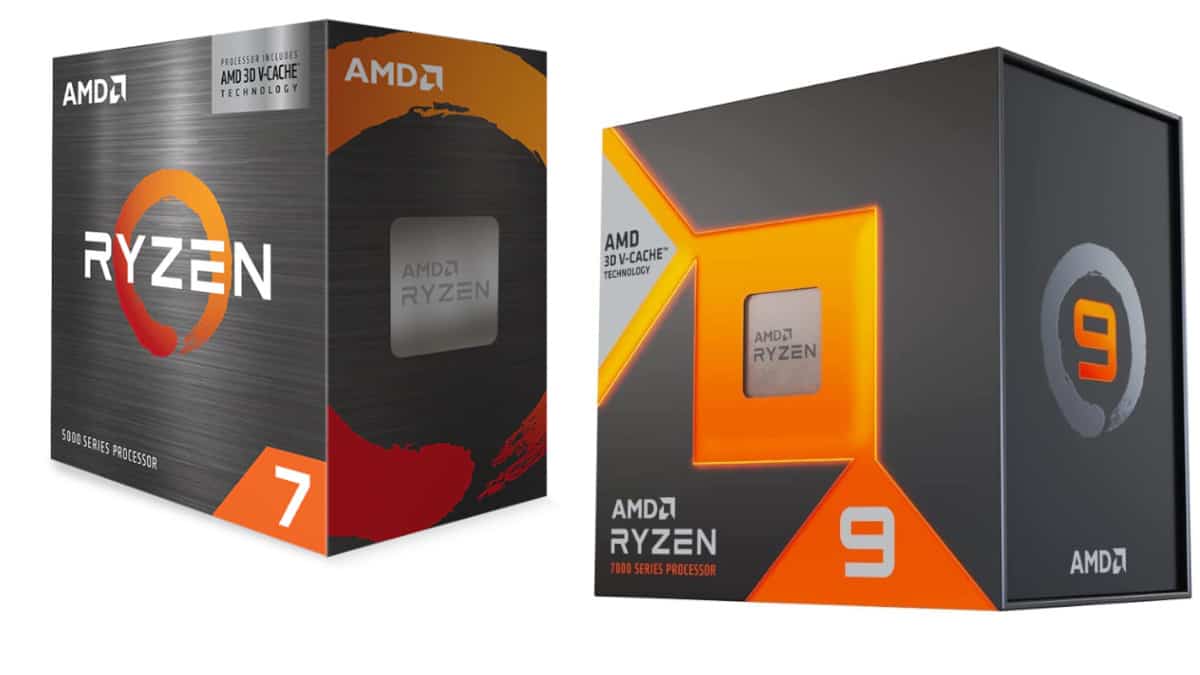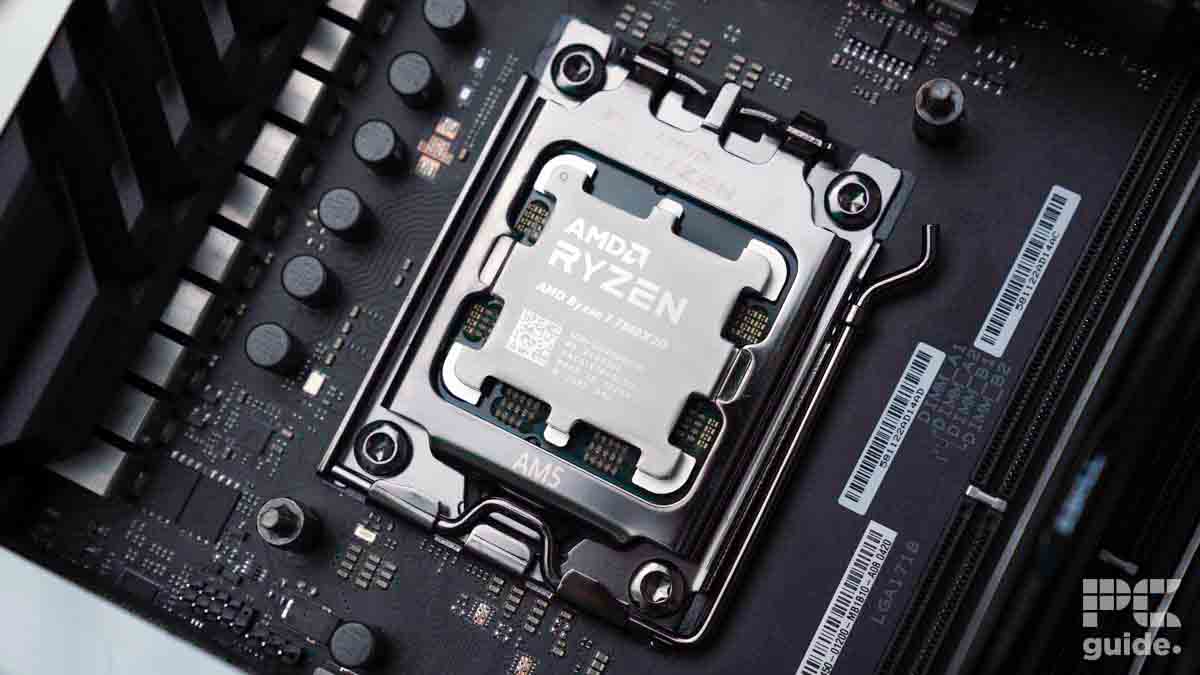Ryzen 7 7800X3D vs Ryzen 7 5800X3D: new or old?

Table of Contents
This article will closely examine two powerful processors from AMD – the Ryzen 7 7800X3D vs Ryzen 7 5800X3D. These processors are specifically designed to provide top-tier performance and are well-suited for demanding tasks such as gaming.
In this article, we will be comparing these two processors based on various factors such as clock speed, core count, cache size, and power consumption. We will also be looking at their respective benchmark scores to see how they stack up against each other in real-world scenarios.
Whether you are a gamer looking for a processor that can handle the latest AAA titles or a content creator in need of a powerful processor to handle heavy workloads, this comparison article will help you decide which processor is the best fit for your needs. So without further ado, let’s dive in and see how these two processors compare.
Ryzen 7 7800X3D vs Ryzen 7 5800X3D: Specs
The Ryzen 7 5800X3D was launched y AMD in the competition in the gaming scenario; and they did. This processor is, to the day, one of the best gaming processors in the market. The price-to-performance ratio of this CPU gives it a balanced that is rarely achieved by other brands.
The first point to stand out in the specs comparison is the frequency of the CPUs. The 7800X3D comes packed with a base frequency of 4.4GHz, which is an entire extra GHz compared to the 3.4 GHz of the 5800X3D. This helps make a more responsive CPU in high-resolution environments; in the same line, the boost speed of the 7800X3D is 5GHz while the 5800X3D could get up to 4.5GHz.
| Specs | Ryzen 7 7800X3D | Ryzen 7 5800X3D |
|---|---|---|
| Architecture | Zen 4 | Zen 3 |
| Process node | TSMC 5 nm | TSCM 7 nm |
| Cores/Threads | 8/16 | 8/16 |
| Frequency | 4.4 GHz | 3.4 GHz |
| Boost clock speed | 5 GHz | 4.5 GHz |
| Socket | Socket AM5 | Socket AM4 |
| Cache L3 | 96 MB | 96 MB |
| TDP | 120W | 105W |
| Launch MSRP | $499 | $499 |
The Ryzen 7 7800X3D has a newer architecture (Zen 4) and is manufactured on a more advanced process node (TSMC 5 nm) compared to the Ryzen 7 5800X3D which is based on Zen 3 architecture and manufactured on TSMC 7 nm process node. This attacks directly the criticism that everybody had about the 5800X3D. This great gaming CPU lacks power and shine when it came to other tasks, especially, multi-tasking tasks such as content creation or streaming.
Thanks to the new core architecture that Zen 4 brings, these lower points are improved intensively. According to the specs and what we've seen of Zen 4 power, the Ryzen 7 7800X3D should be capable of delivering a great performance in multitasking closing the gap between AMD and Intel within this category.
Ryzen 7 7800X3D vs Ryzen 7 5800X3D: price
Price is the sweetest spot for AMD. Both CPUs have a similar MSRP. The 7800X3D will be released, according to AMD, with an MSRP of $499. That is $50 more than the MSRP of the 5800X3D which was released for $449. However, the actual price of the ladder is around $300 at the moment due to price correctness over time.
Considering the real price difference between the two CPUs, the 7800X3D is still a more recommended option over the older version. It’s important to consider the value proposition of each CPU based on its performance and features. While the Ryzen 7 7800X3D has some advantages over the Ryzen 7 5800X3D in terms of clock speeds and power consumption, it’s also important to consider the overall performance and compatibility of each CPU with other components in your system. Therefore, the price of each CPU should be considered alongside its specific features and capabilities to determine which one is the better choice for a particular use case or budget.
Ryzen 7 7800X3D vs Ryzen 7 5800X3D: performance
We acknowledge the impressive gaming performance of the 5800X3D, but can the 7800X3D surpass it? The outlook appears favorable, given the considerably more powerful Zen 4 core of the 7800X3D compared to the Zen 3 core of the 5800X3D. The Zen 4 core delivers substantial IPC enhancements that are highly advantageous for single-core workloads such as gaming.
In contrast to the limitations of the 5800X3D, the 7900X3D is not as restricted since the 7000X3D series is unlocked for automatic overclocking. Therefore, we can anticipate significant performance improvements with the 7900X3D in gaming workloads compared to the 5800X3D.
The new Zen 4 architecture is a great improvement for the 7800X3D CPU. The greater multithreading of the 7800X3D makes this processor a better option for any gamer looking to have the optimal gaming rig.
Ryzen 7 7800X3D vs Ryzen 7 5800X3D: Conclusion
In conclusion, both the Ryzen 7 7800X3D and the Ryzen 7 5800X3D are powerful mid-range processors that are well-suited for gaming. However, the Ryzen 7 7800X3D boasts a more advanced Zen 4 architecture and higher clock speeds, making it a promising candidate for achieving better gaming performance than the Ryzen 7 5800X3D.
Additionally, the Ryzen 7 7800X3D‘s larger cache size and unlocked automatic overclocking capabilities further enhance its potential for gaming workloads. Ultimately, the decision between the two processors may come down to personal preferences and budget, as both offer excellent performance and value for their price point.
- NOW READ – Where to buy the Ryzen 7 7800X3D


